|
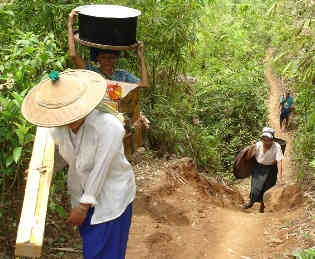
ferrying loads to a hide site
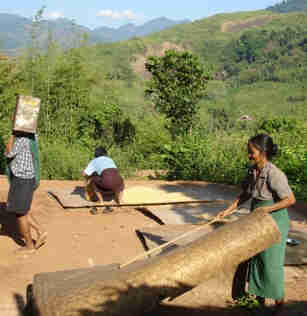
preparing rice
I am writing this to give a picture of how the Karen people now under attack are surviving the onslaught of the Burma Army and continue one of the most positive acts of civil disobedience in Burma.In trying to hold on to their culture, land and freedom they have found themselves to be the enemy of dictators. For this they are hunted, attacked and persecuted.
This offensive, which has already displaced over 11,000 people, is only the latest attempt by the Dictators of Burma to gain control over the lives of the Karen people in the mountains of Western and Northwestern Karen State.
The ability of the people here to continue to survive this attack is amazing. With no or very little outside support they hide their food supplies, prepare hiding places, find food where they can, raise and educate their children and rebuild their homes and villages when the Burma Army finishes their operations. When the Burma Army troops have passed by and are out of the immediate area (although they still may be only three hrs away on foot), the people go back to their fields, barns and houses to gather any food supplies or belongings they can. They also go to hiding places where they have stored food for such an emergency. The people are prepared the year around to flee and hide and survive.
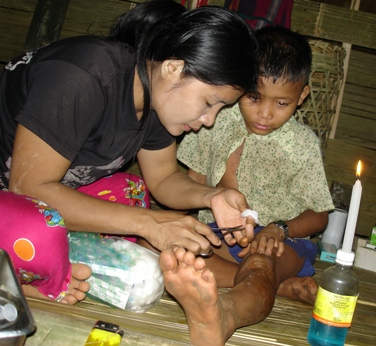
Eh Tah Dah Wah treats a child
Preparation comes at two levels:
First and most importantly, the people help themselves. The Burma Army has been attacking them for over 50 years as a succession of military dictatorships tries to control everyone in the country. On their own initiative they make preparations. Rice is put aside and hidden in different places in the jungle. Hiding places for valuables and people, as well as escape routes, are pre-selected.
The second level of preparation is from the resistance, here, the Karen National Union (KNU). The KNU is an organization that stands for freedom, ethnic rights and democracy for the Karen people. The KNU attempts to protect its people, provide early warning of attacks, and help conduct social and educational programs as well as facilitate the work of relief, social service, and other organizations.
Here in Mon Township, Nyaunglebin District, Western Karen State, for example, as the Burma Army battalions came through this week, the KNU was giving warning to the villagers of the coming attacks and helping find safe routes to escape. They also posted one to two resistance soldiers with every large group of people to protect them if needed and to help organize the escape.
The township leaders all met for an entire day to plan for expected future attacks and to help people recover their food and belongings in areas where the Burma Army had already passed through. Due to regular patrols by the Burma Army in the wake of this ongoing offensive, it is very dangerous for villagers to return to their homes. Not only might the Burma Army ambush people returning to their villages, landmines are also often placed by Burma Army Troops in villages they have already attacked. Knowing that a new attack could come at anytime (In fact a new operation has started again on, May 1st, as two new Battalions IB 141 and Ib142 launched an attack from Muthey Camp into this area), the people and the local leaders worked hard to gather as much rice as they could. At a central place in the township, a generator and mechanical rice mill was brought out of hiding, and in a community effort, rice was brought in from all points to be milled and shared out.
There is a continuous stream of people going out to their fields with empty sacks and returning in the evening with sacks full of rice and whatever belongings they can find that the Burma Army has not destroyed. This is an ongoing effort and reflects not only the organizational abilities of the KNU but also the determination and community spirit of the villagers. Supporting these people (to a very limited degree) are other community based organizations and volunteer groups that bring in emergency supplies of rice (or cash for rice), medicine, clothes, shelter, educational supplies and other relief items. All together the outside help for these people (including ours), is very small.
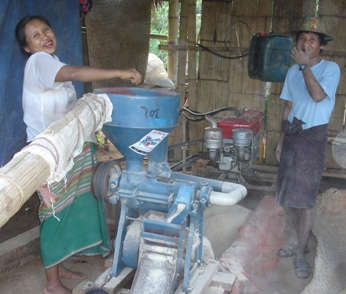
milling rice for villagers
The people rely on each other, their organizational abilities and, for many, their faith. These are not helpless victims. They have not given up, they run and hide when they have to, and then they return to rebuild their homes, restart their schools and make the best of life.
Below are just of few of the outstanding people we have met here.
*Desmond, the chief medic at a mobile clinic.
There are now three gunshot cases, two landmine victims and two sick with malaria at this clinic. He has a staff of four nurses, all young Karen girls between 20 and 25 years old, and operates with the barest of instruments. He and his staff receive no pay, live under the threat of constant attack and yet serve with dedication and care.
*Pastor “Thra Doh”,
Pastor Thra Doh recently led a service in the rain for the 300 people who were fleeing the Burma Army. They all arrived at a river in a downpour and had to huddle under pieces of plastic or banana leaves as the rain came down. On the second day at this hide site, the pastor organized a prayer service. The next day a powerful wind storm (from a Typhoon in the Bay of Bengal) caused many trees to fall. He got his family and two other families out of three shelters just before a giant tree snapped and crashed down on his and the other two families’ shelters. He had painstakingly built his shelter out of bamboo and had just finished the thatch roof, which took two days to construct. Now the hut and all his families’ possessions lay under the fallen tree. What was his reaction to thus new calamity? He looked at the mess as he stood in the wind and rain, then he turned to the team and laughed and said, “Look, God just sent me firewood!” He then set about making another shelter for his family.
*Naw Eh Tah Dah Wah Nurse, age 24.
Naw Eh Tha Dah Wah works in a mobile clinic in a different location. We met her one night as we were preparing to move to the area of the newest attack further south. She saw me, smiled brightly and said in English, “Good Night.” She then invited me to her clinic over the next ridge. She was very animated and told me how last month (March), the Burma Army attacked and she had been on the run for 5 days with no food. “But I never give up because God is my strength, I want to help my people and as a nurse I can help them in many ways,” she said. I asked her if she was afraid of the Burma Army. “Oh yes,” she said, “I am afraid of them, but I will never give up. I trust in God and will run with my people when they come. And when the Burma Army goes back to their camps we will start our lives and work again. I am happy to do this.”
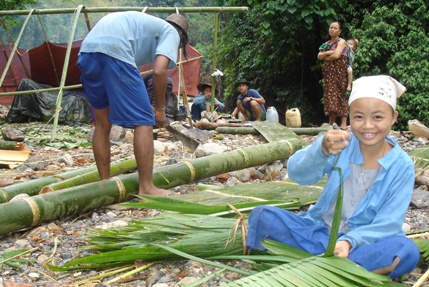
making a shelter
In closing I would like to share some of the good things we the team have experienced on this mission so far:
1) The way that people who have lost their homes and belongings share and look after each other. Orphans and widows are taken in and helped on the way, and no one is left behind.
2) How people under direct Burma Army fire, help each other, even as some are killed, others run back to help the survivors, especially helping to carry the children.
3) How a husband and wife who themselves were in hiding, helped treat the wounds of a 9 year old girl shot by the Burma Army. Her father and 80 year old Grandmother (who her father was carrying) was killed in the same attack. For her survival, and for our medics who helped her on the way. For her smile after she was treated. For how she keeps on smiling.
4) The dignity of the Karen; like an old man, dressed in his red traditional tunic, who closed a Easter service with a deep and moving prayer that covered the issues on our hearts.
5) For leaders who are here with their families. In an emergency meeting of all the top leaders in this township, I saw that 2/3rds were in their mid twenties to early forties, and that the older leaders gave equal time for all. The Township leader said, “We have to take care of our people…we have to share everything…we cannot think of ourselves”.
6) For people in the resistance like, Mr. Eh Wa, a high school teacher for displaced children, who smiles all the time and yet only sees his family twice a year and has already spent 7 years in prison. When I asked him why he endures the separation from his family and the risk of capture or death, he said with a smile, “For the freedom of my people”.
7) For these people who love their land and belong to it.
We recently walked to where the Burma Army had attacked a village destroying homes, looting possessions and burning the village church. We were led by a group of Karen and it is a thing of beauty to watch their agility and speed in the jungle. They watched for the Burma Army but when we passed under a fruit-bearing tree, they stopped and climbed high in the tree to bring us some of the fruit. They are an example of men completely at home in their environment. They are sure of themselves yet not arrogant, fluid in motion and appreciative of all of nature’s bounty. When we arrived at the remains of the village, these men looked at the destruction and then at us. They shrugged and one man said, “We have to try…this is our home…we will not give up”.
God bless you,
The Free Burma Rangers
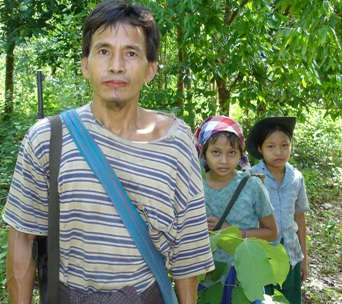
father with two daughters
ENDS
